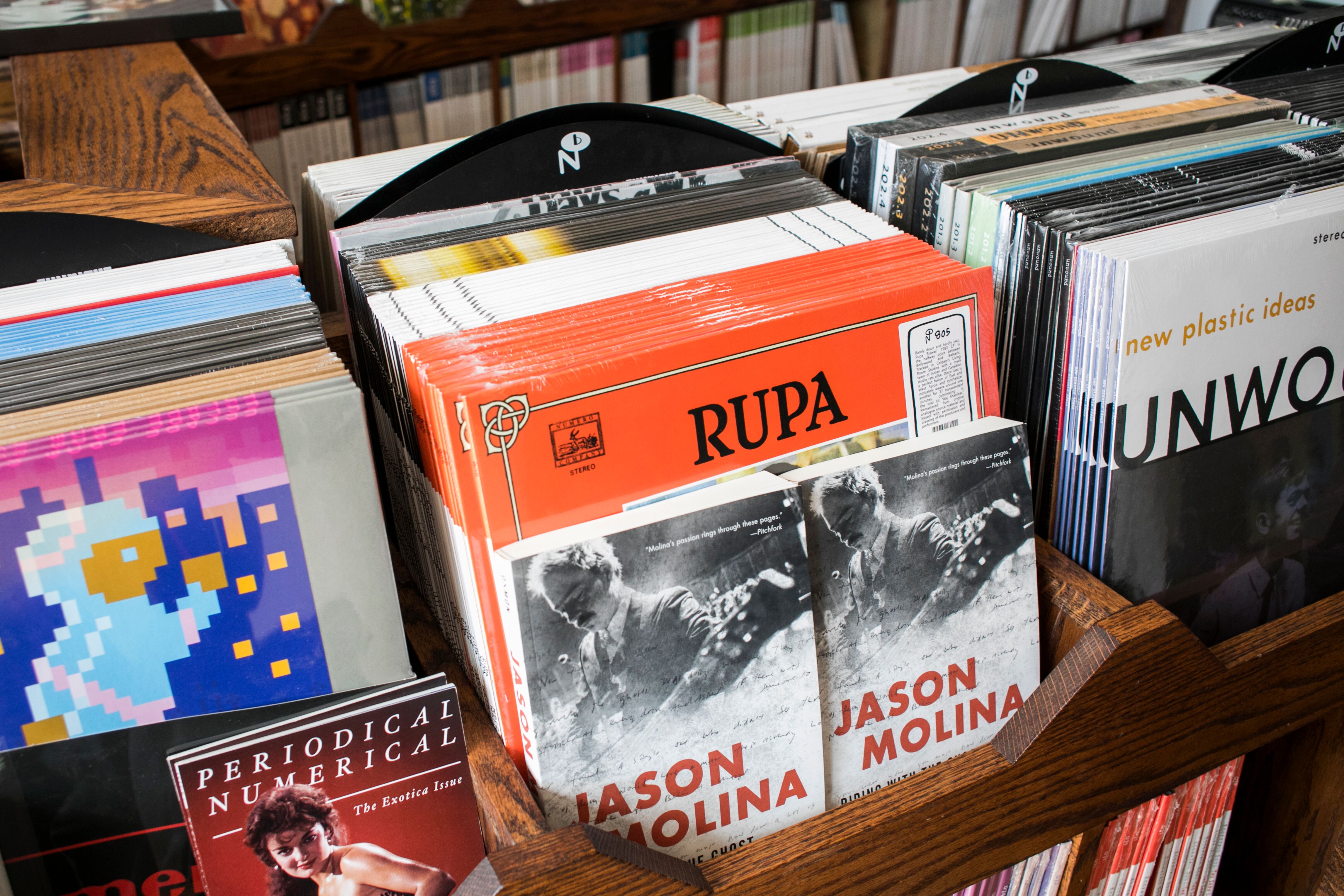In 1970, Bill Moss, a radio DJ at WVKO in Columbus, Ohio, took out a $150,000 loan from the bank to start a record label called Capsoul and produce records by local artists. Though he had dreams of matching Motown Records, Moss achieved minor success with acts like The Four Mints, a soul group that thrived regionally, and Marion Black, whose 1970 single “Go On Fool” peaked at 39 on the Billboard R&B chart. But before the label could really break out, the bank asked Moss to repay the loan. When he couldn’t, they padlocked his studio and shuttered Capsoul for good after just five short years. By the time its doors had closed, the label had released a dozen singles and one LP.
But Capsoul’s story didn’t end there. It got a second life thanks to fledgling Chicago-based reissue label Numero Group.
Founded by music industry veterans Rob Sevier and Ken Shipley in 2003, along with Tom Lunt (who left the label in 2013), they were initially floored by a rare 7-inch vinyl of “You Can’t Blame Me” by the Capsoul-signed group Johnson, Hawkins, Tatum & Durr. Sevier and Shipley sought out Moss, getting him to agree to have them re-release his discography. Because Capsoul’s master tapes were destroyed, they made Numero Group’s first official release, a 2004 compilation Eccentric Soul: The Capsoul Label, by getting clean rips of pristine vinyl Shipley and Sevier found through crate-digging and Ebay auctions.
Eccentric Soul: The Capsoul Label proved to be an instant success, selling well immediately, and getting press from NPR and CNN. But it also gave Moss a second chance to celebrate his musical career all while getting royalties decades later. Though Moss passed away in 2005 after its release, the songs from The Capsoul Label have endured for Numero Group, appearing in countless movies like In The Mix, Who Killed The Electric Car, and Diggers, TV shows like How I Met Your Mother, Weeds and Psych, as well as advertisements and samples by artists like Wiz Khalifa and Mobb Deep. It set the stage for Numero Group to become one of the most essential and thriving reissue labels with over 350 physical titles and an extensive digital-only catalog today. By bucking trends and constantly adapting to the marketplace, they’ve managed to secure eight Grammy nominations, have had their songs featured in Oscar-winning movies, and have had their catalog sampled by artists as well known as Jay Z and Kanye West.
“That record has just been kind of perennial. When we put it out, we were interested in just a couple that we thought were going to be the key songs but now it’s between nine and 12 of those songs that regularly make different kinds of money all year in different ways,” says Shipley on a couch in Sevier’s apartment behind Numero Group’s flagship office in Chicago’s Little Village neighborhood.
Reissues have long been a feature of the music industry. Harry Smith’s 1952 Anthology of American Folk Music compiled long out-of-print 78 records released between 1927 and 1932 and inspired the wave of ’60s protest music, especially Bob Dylan. Major music conglomerates like Warner Brothers have their own reissue labels like Rhino Records, founded in 1978, that focused on putting out their favorite out-of-print records and is still active today. But while Rhino played by the books, much of the reissue market featured cut-rate labels littering stores with unlicensed bootlegs. By the time Numero Group formed in 2003, they looked to the UK boutique reissue labels like Soul Jazz and Honest Jon’s as guideposts to how to do it right and so did their peers in newfound U.S. reissue labels Light In The Attic and Now-Again.

“We started the company with $23,000 so it wasn’t a lot of money to work with but that all went into putting out the first two records. We just got lucky,” says Shipley. He adds, “At the time, there was a real hole in the American reissue market. All the good stuff was kind of coming out of Europe and nobody here really had a grasp on how to handle American soul music. I think we sort of made a new way to think about it.” With an austere but effective design aesthetic, meticulously researched liner notes, an obsessive attention to detail and a passion to preserve good music, Numero Group separated itself from the pack.
Numero Group’s ethos revolves around finding what’s worth saving and celebrating the underdogs, outcasts and unlucky stories of the music industry. For Sevier and Shipley, failure is a more interesting story than success which is why they celebrate “lovingly mishandled” artists like Bill Moss’ Capsoul Label in their Eccentric Soul series. Whether it’s poor business decisions, industry fallouts, missed chances, being too ahead of the times or just terrible luck, Numero Group has served as a corrective to the vulture-like world of the music industry. They’ve reissued records like Willie Wright’s 1977 folk LP Telling The Truth, a black songwriter who self-released his own albums from the back of his car’s trunk, or Nicaraguan Latin jazz artist Alfonso Lovo, who smuggled the only acetate of his 1971 album La Gigantona to New Orleans as he was escaping the Sandinistas. For Numero Group’s catalog, no two artists have the same story.
“What set the tone really early is that we paid royalties on time every six months. We did all the things we said we were going to do. Once you kind of create a good base like that, it’s just about building on top of it,” explains Shipley. Though Numero Group’s earliest incarnation was in Shipley’s fourth story walkup in Chicago’s Bucktown neighborhood, his and Sevier’s business acumen and commitment to fulfilling their promises to the artists they worked with set their reputation. Says Shipley, “Rob and I were really fortunate to find each other because we both had a lot of drive to do it and to do it right.” Their drive has paid off. Along with its flagship location in Little Village, the label also has an outpost in Los Angeles, and a 2013 merger with independent music behemoth Secretly Group are markers of their sustainable growth.
Though Eccentric Soul was the start, Numero was never exclusively interested in one specific genre. They’d go on to put out releases of oddities and outliers from across the musical spectrum, from gospel to folk, electronic to disco, punk and indie rock like Unwound, Codeine and Dinosaur Jr, as well as international interpretations of American music scenes to name just a few. This year alone features a lineup that boasts reissues from a cult space rock band Duster, a 12-inch single of mid-80s electro-funk from Bay Area collective New World Music, a compilation of ‘80s synth ephemera and a Bollywood boogie classic from Indian singer Rupa called Disco Jazz that got surprising traction on YouTube. Sevier, who typically defers to his more talkative label partner to answer questions, explains, “Someone could just put something on YouTube and it slowly builds without any fuss. It catches on just by being there. It’s not a model, just a market reality. We’ve changed our thinking about what we do drastically.”
For the label that doesn’t put out releases by new artists, there isn’t a single traditional route to discover the next release. If they find something that blows their minds and it hasn’t been given the proper treatment, then it’s up for consideration.
“The thing that is really important to note is that there isn’t one way we find music for the label,” says Shipley, citing yard sales, record collectors trading LPs, YouTube and pure chance as methods of discovery. Sevier chimes in: “We are discovering music and we have a temperature controlled archive downstairs in our office where it’s filled with tapes we’ve gotten over the years. There’s stuff that we haven’t done anything with yet but we always go back to it and find new things.” He adds about balancing his tastes with his staff’s, “We let things rise to the top. There is sort of like a Hegelian Dialectic conflict that emerges. People will duke it out and stuff will get suppressed for a long time and then it’ll find a new way back into the fold.”
One of the hallmarks of Numero Group’s operating philosophy is patience. “Sometimes you just need to wait where you’d put something out and immediately you’d think no one cares about it but then it finds a whole audience that we didn’t know was going to exist,” says Shipley, citing Numero Group artist The Edge of Daybreak, which found a new audience when it was featured in the Oscar winning film Moonlight. Sevier adds more examples: “There’s a there’s a lot of records like 24 Carat Black or Father’s Children, that pretty much bombed at the outset and then became something over time.” For the latter, the song “Dirt and Grime” was sampled in Kanye West’s The Life of Pablo cut “FACTS.” But whether or not a Numero Group release finds a new life, it will always be expertly and lovingly packaged with a numbered catalog, high quality historical photos, educational and exhaustive liner notes, and always audiophile grade vinyl. Whether it’s an LP release, a box set or a compilation, their obsession with detail and care is uniform across Numero Group’s discography.

Above all, Numero Group have managed to adapt and evolve. Though their origins coincided with the skyrocketing resurgence vinyl album sales (according to the RIAA, revenues from vinyl sales in 2018 hit the highest level since 1988 totaling $419 million) they aren’t content to just ride the wave. Unlike most of their reissue label peers, Numero Group has embraced streaming, creating a vast ecosystem on digital platforms with playlists and guides of their entire catalog. Along with that immediately accessible archive, Sevier notes that they’re evening playing with the way they release music: “We’re also moving away from release dates, letting something go on digital platforms well before it actually comes out physically. We’re not tying ourselves to it.” Shipley adds, “We try not to be as strict because the reality is that people just want to listen to the music and they don’t really care about your rules. We like to think that we’re setting trends, not chasing trends.”
For Numero Group, it’s doing things differently that is the real secret to the label’s success.
“We don’t have any rules. A lot of other labels have rules. We decided to throw the rulebook out a long time ago. We always think, let’s make an app, let’s make a magazine or let’s do a podcast,” says Shipley. With that in mind, in 2018, Numero Group unveiled its mobile app Environments, which creates ambient sound with nature recordings on long-form loops compiled from 22 analog recordings from field recordist Irv Teibel. It topped Apple’s Paid App charts. “We’re constantly changing. We stayed up until midnight last night just thinking, ‘what’s next?’ We’re always curious about the future.”
This article was featured in the InsideHook newsletter. Sign up now.


















